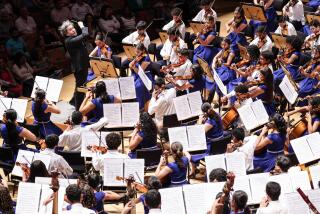Klas Finds the Subtlety in Tchaikovskyâs Fourth
Poor Tchaikovsky. Every summer at the Hollywood Bowl (and elsewhere) his Fourth Symphony, one of his greatest works, gets trotted out and played for kicks--mined for the cheap thrills of blaring brass, gushing lyricism, cymbal crashes and rocketsâ red glare.
Fortunately for Tchaikovsky, Estonian conductor Eri Klas was on hand Tuesday at the Bowl to lead the Los Angeles Philharmonic once more into the breach. A graceful and intelligent musician, Klas didnât go for overkill, instead seeking subtlety and quietude, smoothness and logic.
These are relative terms, of course, in Tchaikovskyâs Fourth, but even when the brass were going full throttle, in Klasâ interpretation you could hear the strings. Even in the recurrent, agitated âFateâ motif, he sought breadth and sostenuto; even in ruggedness, he enforced a connected long line.
Klasâ best moments, though, came in the softer spots--the stillness of the woodwind and timpani passages in the opening movement and, especially, the pizzicato third movement. Here, putting his baton down, he feinted and dodged through its ins and outs, highlighting phrases with the poke of a nose or the flick of a wrist. It coasted on air.
What this reading lacked in uttermost passion, it made up for in detail, and the Philharmonic responded with balanced, precision playing.
Principal cellist Ronald Leonard seized the solo spot with Dvorakâs Cello Concerto. His was an alert, technically-at-ease and rhythmically pointed account, also not over-the-top emotionally. Much of the music benefited from his restraint--the opening pages of the Adagio were laced beautifully--but some of the grandeur went missing in the wide-open spaces.
The concert began with a little dance number, the Polonaise from âEugene Oneginâ (by Tchaikovsky), in which Klas found both opulence and chivalry.
More to Read
The biggest entertainment stories
Get our big stories about Hollywood, film, television, music, arts, culture and more right in your inbox as soon as they publish.
You may occasionally receive promotional content from the Los Angeles Times.










